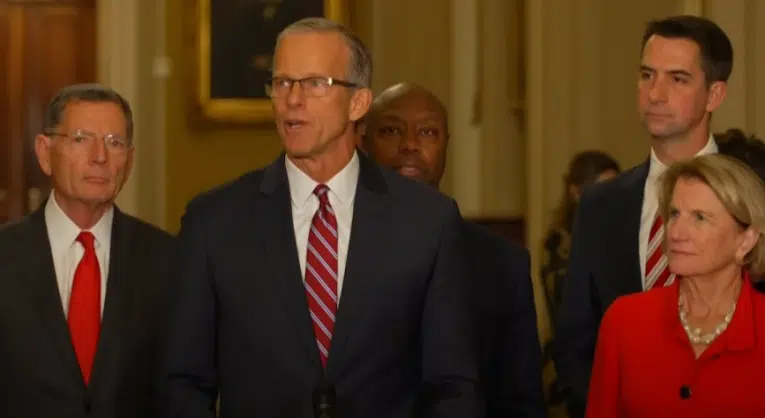By Rick Manning
The payroll tax debate has been and will continue to be at the forefront of the political back and forth in Washington, D.C., with Republicans continuing to agree with President Obama that a full year extension is the best alternatives, and President Obama and the Senate Democrats refusing to take yes for an answer.
Over the past month, Obama made grand, uncontested public pronouncements about what people could do with an extra $40 a month through his legacy media messaging partners.
What those partners were either too lazy or deliberately missed is that the payroll tax cut that is being extended for at least another two months has already been spent by consumers.
At least that is what Obama himself admitted as far back as March of 2011, when he said, “Gas prices are hurting individuals right now and obviously taking some of that tax cut that we gave them and forcing them to use it on gas, as opposed to buying other items.” In fact, Obama’s own Department of Energy estimated that gasoline price increases alone would cost the average U.S. consumer around $700 per year.
And many analysts believe that oil prices will continue to rise significantly in the upcoming year based upon supply and demand factors.
On top of this prediction, over the next three years, U.S. consumers will face the costs of just announced Environmental Protection Agency (EPA) regulations that the Administration itself admits will likely drive around 75 coal fired electricity generating plants into extinction over the next three years, creating major jumps in electricity bills for many consumers.
However, in spite of the best efforts of this Administration, America is on the verge of an energy revolution with consumer costs plummeting due to secure North American sources of oil and natural gas.
Innovative technologies for unleashing huge oil shale deposits in North Dakota and neighboring Canada combined with natural gas discoveries primarily located in the northeastern United States will be the building blocks for a second American century.
The North Dakota miracle has turned the formerly sleepy state into a booming economy which by the end of 2012 will likely become the second largest oil producing state in the nation passing both California and Alaska.
The oil find in Alberta, Canada is even more stunning, with some oil experts estimating the reserves at eight times the size of the Saudi Arabian fields.
This dramatic increase in North American oil production, if accompanied by a national energy policy that allowed for the development of many known Alaskan and Gulf of Mexico reserves could be the key to a U.S., and worldwide economic recovery.
While it is hard for the economic geniuses in the Administration to fathom that oil, coal and natural gas are the fuels that make our nation and the world run rather than the preferred 15th century technology windmills and costly and inefficient solar.
The North Dakota oil finds and their rapidly accelerating delivery to markets along with the massive expansion of natural gas development signify that our nation is on the edge of a cheap, reliable energy driven economic boom.
It turns out that we have massive oil and natural gas reserves, well beyond the imagination of those limited mid-20th century doomsayers whose dire, yet false, predictions of the world running out of oil filled baby boomers heads with an acceptance that fossil fuels needed to be phased out for our very survival.
As readers of Ayn Rand’s classic, Atlas Shrugged, can attest, it is no secret that there are massive deposits (estimated at 2 trillion barrels) of shale oil in Colorado, Wyoming and Utah alone. Let alone the untapped new reserves found in Texas which are projected to be almost as large as the North Dakota field and the natural gas discoveries in Pennsylvania, Ohio and New York.
In fact, the estimates for our nation’s natural gas reserves have reversed course so incredibly that the U.S. will soon become a net exporting nation of the clean burning fuel. The revolution in natural gas development has resulted in some observers calling the United States, “the Saudi Arabia of natural gas.”
The U.S. Energy Information Administration even calls the massive shale natural gas reserves and their development, “a game changer.”
What are the effects of all these new oil and gas discoveries? Economic revitalization, resurgence as the natural gas boom itself is expected to create a million new industrial jobs in the next fifteen years according to PriceWatershouseCoopers.
Additionally, job creation related to the still Obama Administration unapproved Keystone XL pipeline would result in thousands of new jobs and more than $6.8 billion in economic activity.
Throughout the economy, lower fuel costs will result in lower core business costs, effectively giving the economy a massive market driven stimulus that will free up resources for other business expansion activity and the resultant job creation.
Secure domestic fuel supplies also has the impact of making our nation less reliant on some of the most reliably unreliable oil exporting nations in the world, allowing U.S. based companies to have dependable, inexpensive energy to run their businesses.
Of course, the wild card in the whole equation is a government and its environmentalist allies that seem determined to drop-kick any domestic energy development which falls outside the politically favored alternative energy dynamic.
Hopefully, unlike the payroll tax fight, the Obama Administration will just get out of the way and say yes to this manna from heaven which has the capacity to bail out him out from the tragic results of three years of policies seemingly designed to turn America into a third world nation.
America has the resources, the manpower, the economic system and the initiative to make the 21st century the next American century, if our political leaders will only let her.
Rick Manning is the Director of Communications for Americans for Limited Government.






